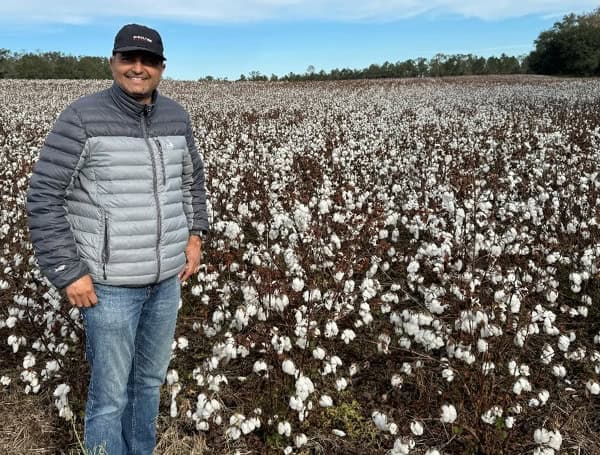The United States leads the world in cotton exports by value, accounting for $5.7 billion, or 33%, of exports of the textile, according to the U.S. Department of Agriculture. But researchers hope to bolster American production even more through a pair of studies designed to identify the most robust cotton seed varieties available. Thirteen universities, including the University of Florida, are participating.
Each university is in a cotton-producing state. In addition to UF, they are North Carolina State, the University of Missouri, Texas A&M, Oklahoma State, Arizona State, Kansas State, Mississippi State, Virginia Tech, Clemson, Auburn, the University of Georgia and the University of Tennessee.
Read: How Many Plants Are In Your Yard? UF Study Finds High Plant Diversity In Residential Landscapes
Sudeep Sidhu, a UF Institute of Food and Agricultural Sciences (IFAS) agronomist is spearheading the Florida studies from the UF/IFAS North Florida Research and Education Center in Quincy.
“Trials like this serve as a benefit to farmers and to seed manufacturers because they get to know their production potential,” Sidhu said.
Both studies are sponsored by Cotton Incorporated, a not-for-profit company that supports industry research.
The aim of the first study is to understand cotton seed germination potential in less-than-ideal growing conditions, specifically, when soil temperatures are cool.
The optimal soil temperature for cotton seed germination is between 65 and 85 degrees. In Florida, this means seeds are planted from late April to early June, depending on whether irrigation is available. Harvest generally takes place around October.
Read: Florida Citrus Industry Continues To Feel The Squeeze
Sidhu and his counterparts at the participating universities each received 23 cotton seed varieties from seed manufacturers, and they plan to sow them before daytime soil temperatures rise above 70 degrees. The seeds are marked, but their variety is unknown to the researchers. Once the seedlings emerge from the soil, the researchers will measure the length of their radicle, or primary root.
Current cool-temperature seed-germination protocols dictate germination only takes place when a plant’s radicle length reaches 4 centimeters, or approximately 1.6 inches.
“The rationale behind this study is to develop more information on the cool germination behavior of these 23 different varieties so we have more data to see if we still need that 4-centimeter length as a threshold to consider germination,” Sidhu said.
The second study, a cotton variety evaluation partially underway, is geared toward determining which cotton seed varieties grow best in particular climates. In Florida, 26 seed varieties will be sown in four counties: Gadsen, Jackson, Jefferson and Suwannee. The seeds, donated by industry partners, will be grown under irrigated and non-irrigated conditions as small plot replicated trials in Quincy and Live Oak. Between 10 and 12 of these varieties will be planted without irrigation on farms in Jackson and Jefferson counties.
Read: Segrest Farms’ Sandra Moore Wins 2024 Woman Of The Year In Florida Agriculture
The success of the on-farm trials would not be possible without the help of collaborating growers, Sidhu said.
“The purpose of this project is so all cotton specialists in the United States should be able to tell their stakeholders which varieties perform better for their location or for locations around their farm,” Sidhu said.
Help support the Tampa Free Press by making any small donation by clicking here.
Android Users, Click To Download The Tampa Free Press App And Never Miss A Story. Follow Us On Facebook and Twitter. Sign up for our free newsletter.

